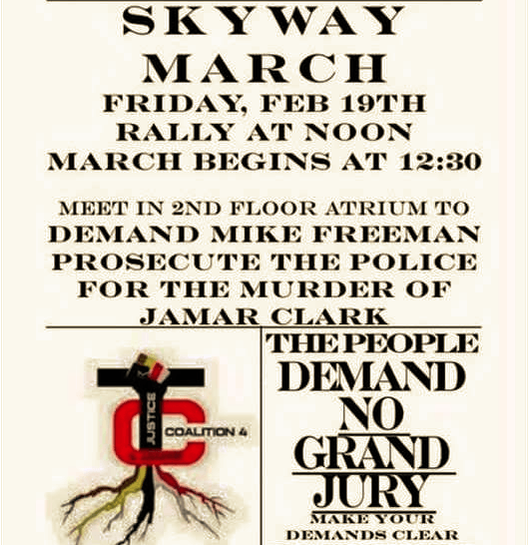Freeman Friday
February 16, 2016Photo and reporting also published in the [Southwest Journal]
Join the [Twin Cities Coalition for Justice 4 Jamar] this Friday, February 19th for the second installment of Freeman Friday! We’ll be marching through the skyways downtown to County Attorney Mike Freeman’s office to demand direct prosecution of the officers who fatally shot Jamar Clark in November.
RSVP on the [Facebook event page] and invite your friends. Freeman Fridays will continue every week to keep pressure and public attention on Mike Freeman’s upcoming decision on the Jamar Clark case.
What’s the point of showing up at Mike Freeman’s office?
Last Wednesday, the Minnesota Bureau of Criminal Apprehension (BCA) announced that it had concluded its investigation into Jamar Clark’s shooting death at the hands of officers Mark Ringgenberg and Dustin Schwarze. It’s now up to Freeman to decide if more investigation is needed, and whether to either prosecute the officers responsible or call a grand jury. He’s previously indicated that he intends to send the case to a grand jury.
“We’re here to demand that that does not happen,” said Loretta VanPelt of the Twin Cities Coalition 4 Justice 4 Jamar at last Friday’s protest. “Since 2000 in Minnesota, there have been around 141 people who have been killed by police, and not one time has a grand jury indicted.”
What are grand juries?
In a nutshell, grand juries decide whether to charge someone with a crime. They don’t decide whether that person is guilty or not, but whether there’s evidence to believe they might be guilty. That’s a very low standard. If a grand jury chooses to indict, that just means there will then be a trial to determine whether that person has committed a crime.
Why are grand juries unjust in police brutality cases?
Unlike in a trial case, there aren’t two sides presenting evidence and holding each other accountable to the facts. Only the state prosecutor presents evidence to the grand jury. The prosecutor gets to choose what evidence to present, what evidence to omit, and how to spin that evidence.
This is a problem because prosecutors have close relationships with the police officers because they need police cooperation to do their job effectively. It’s not in their interest to call for an indictment since doing so puts them on the wrong side of people whose good will they rely on.
Grand juries are also cloaked in secrecy, which means the public generally doesn’t have the chance to see why cases that seem to have enough evidence for a trial will never see their day in court.
Why should Jamar Clark’s case go directly to trial?
Jamar Clark was shot to death by Minneapolis police last November. Eyewitnesses to the shooting say Clark was lying face down in handcuffs, not struggling, when he was shot. The police union claims he reached for an officer’s gun.
“If you were accused of shooting someone who was unarmed and possibly had handcuffs on, would they be putting off the investigation for months and months and months?” asked Kieran Knutson of the Coalition 4 Justice at last Friday’s event. “Would they be having some long consideration…about whether you would be tried or not?”
The eyewitness testimony, along with the unreleased video that Governor Mark Dayton says was “inconclusive,” at least proves there is reason to doubt the officers’ claims that Clark reached for the cop’s gun. That alone should warrant a fair trial where a jury considers all the relevant evidence, not just the evidence the prosecutor cherry-picks.
Regardless of whether or not you think those officers are guilty of murder, that determination should be made the same way it is for everyone else: through an accountable, transparent legal process that considers all pertinent evidence. If several eyewitnesses said one my friends or family members killed someone, I would want them to receive a fair trial too, no matter how much I love them or believe them incapable of murder. Why should it be any different for police officers?


